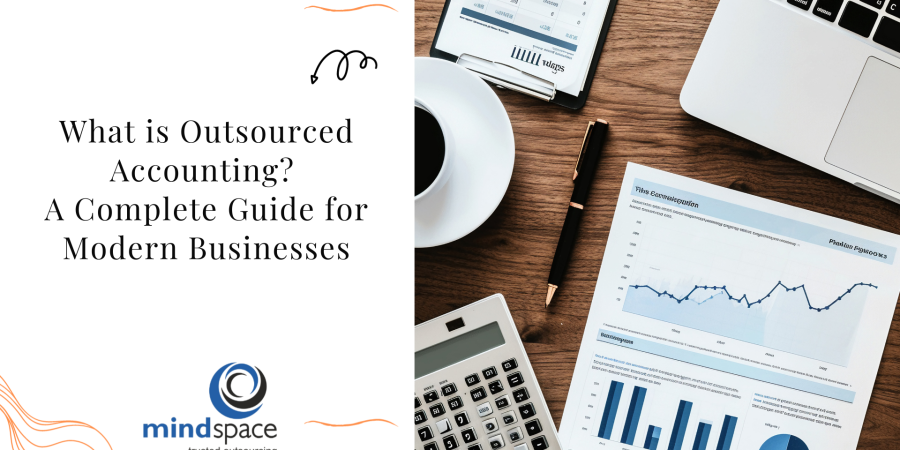What is Outsourced Accounting? A Complete Guide for Modern Businesses
In today’s fast-paced and competitive business landscape, companies are constantly seeking smarter, more efficient ways to manage operations, stay compliant, and make informed financial decisions. One solution that has gained significant traction is outsourced accounting.
If you’ve ever asked yourself, “What is outsourced accounting?” — you’re in the right place. This comprehensive guide will explain the definition, process, benefits, common misconceptions, and how to decide if outsourcing accounting is right for your business.
What is Outsourced Accounting?
Outsourced accounting is the process of hiring an external firm or professional to manage your company’s financial and accounting functions. These services can include:
- General ledger maintenance
- Payroll processing
- Accounts receivable and payable
- Financial reporting
- Tax preparation and filing
- Audit support
- Budgeting and forecasting
- Virtual CFO advisory services
Rather than building and managing a full in-house finance department, businesses entrust these responsibilities to specialized third-party providers — either local or offshore — who bring industry expertise, advanced tools, and cost-efficiency.
How Does Outsourced Accounting Work?
The process of outsourcing accounting services generally involves three key stages:
1. Needs Assessment
The business identifies which accounting functions to outsource — from basic bookkeeping to full financial management.
2. Selecting the Right Partner
The company chooses an experienced and certified outsourcing partner (CPA, ACCA, or CA) with relevant technology skills and a strong understanding of compliance and security.
3. Onboarding and Integration
The outsourced team is onboarded, and software such as QuickBooks, Xero, or NetSuite is integrated for smooth workflows. Data is exchanged securely via cloud platforms or automated systems, ensuring transparency and real-time access.
Why Do Businesses Outsource Accounting?
Outsourcing accounting isn’t just a trend — it’s a strategic move that helps companies:
- Reduce overhead costs
- Access specialized expertise
- Improve financial accuracy and compliance
- Scale effortlessly with business growth
- Focus on core business functions
From startups aiming for lean operations to growing enterprises seeking robust financial reporting, outsourced accounting delivers unmatched flexibility and value.
Types of Outsourced Accounting Services
Here’s a breakdown of the most commonly outsourced accounting tasks:
1. Bookkeeping
Tracking income and expenses, reconciling bank statements, and categorizing transactions.
2. Payroll Processing
Managing salaries, tax withholdings, employee benefits, and labor law compliance.
3. Accounts Payable & Receivable
Handling invoices, vendor payments, collections, and customer billing.
4. Financial Reporting
Generating key financial statements: Profit & Loss (P&L), Balance Sheet, and Cash Flow reports.
5. Tax Preparation & Filing
Preparing tax returns, managing deductions, and ensuring compliance with local and federal laws.
6. Audit Support
Preparing documentation and assisting during internal or external audits.
7. Budgeting & Forecasting
Building financial models, budgets, and cash flow forecasts to guide strategic decisions.
8. Virtual CFO Services
Providing executive-level insights and strategic financial planning without the cost of a full-time CFO.
Key Benefits of Outsourced Accounting
Here’s how accounting outsourcing process can transform your business:
1. Cost Efficiency
Avoid salary, benefits, and infrastructure costs of in-house teams. Outsourcing offers expert service at a fraction of the cost.
2. Expertise On-Demand
Get access to highly qualified professionals with deep knowledge of tax laws, compliance, and industry-specific practices.
3. Increased Focus on Core Activities
Free up your internal resources to focus on growth, product development, and customer service.
4. Access to the Latest Accounting Technology
Benefit from modern tools and dashboards that deliver real-time insights and automate manual tasks.
5. Scalability
Easily scale services up or down based on business needs, seasonality, or expansion.
6. Improved Accuracy and Compliance
Minimize human errors, avoid penalties, and stay audit-ready with clean, compliant records.
Common Myths About Outsourced Accounting
Let’s clear up some common misconceptions:
❌ “Only big corporations outsource accounting.”
✅ Truth: Small businesses and startups gain the most from outsourcing due to cost savings and professional support.
❌ “You lose control over your finances.”
✅ Truth: Outsourced teams often offer more visibility with real-time dashboards, regular reporting, and direct communication.
❌ “Outsourcing is insecure.”
✅ Truth: Reputable firms use encrypted systems, GDPR compliance, ISO 27001 standards, and secure cloud environments to protect your data.
❌ “It’s hard to communicate with outsourced teams.”
✅ Truth: With tools like Slack, Zoom, Trello, and shared cloud drives, communication is often more efficient than in-house workflows.
How to Choose the Right Outsourced Accounting Partner
Here’s what to consider before making your decision:
✔ Industry Experience
Ensure the provider understands your sector, business model, and tax environment.
✔ Certifications & Compliance
Look for CPA, ACCA, and CA designations and ask about data security certifications like ISO 27001 or GDPR.
✔ Technology Compatibility
Confirm they are proficient in your preferred accounting software or can help you upgrade to better solutions.
✔ Communication Standards
Agree on regular updates, meeting frequency, reporting formats, and access to financial dashboards.
✔ Transparent Pricing
Avoid hidden charges — ask for a clear cost breakdown, service scope, and billing frequency.
Is Outsourced Accounting Right for Your Business?
Outsourced accounting is a great fit for:
- Startups and small businesses with limited resources
- Growing companies seeking expert financial support
- Nonprofits and NGOs need transparent reporting
- International businesses with multi-country accounting needs
- Any business owner spending more time on books than on strategy
Final Thoughts
So, what is outsourced accounting? It’s a strategic, flexible, and cost-effective approach to managing your finances — without the burden of hiring in-house staff.
In a world where accuracy, compliance, and agility matter more than ever, outsourcing your accounting helps you stay ahead. Whether you’re a bootstrapped entrepreneur or a thriving company, outsourced accounting could be one of the smartest decisions you’ll make for long-term growth and operational efficiency.


